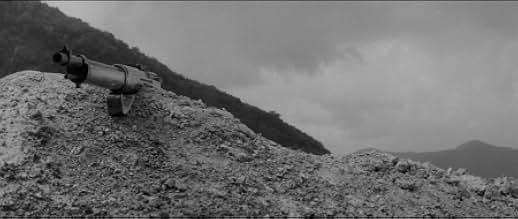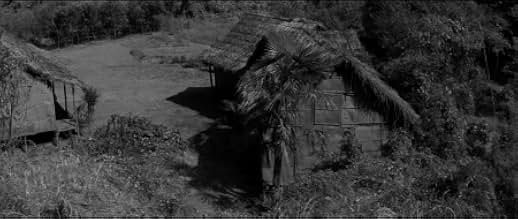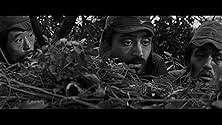VALUTAZIONE IMDb
7,9/10
5624
LA TUA VALUTAZIONE
Negli ultimi giorni della seconda guerra mondiale, i resti dell'esercito giapponese a Leyte vengono abbandonati dal loro comando e rischiano la morte certa per fame.Negli ultimi giorni della seconda guerra mondiale, i resti dell'esercito giapponese a Leyte vengono abbandonati dal loro comando e rischiano la morte certa per fame.Negli ultimi giorni della seconda guerra mondiale, i resti dell'esercito giapponese a Leyte vengono abbandonati dal loro comando e rischiano la morte certa per fame.
- Regia
- Sceneggiatura
- Star
- Premi
- 6 vittorie totali
Recensioni in evidenza
A harrowing masterpiece on the sheer madness and despair of war, Fires on the Plain (Nobi) is not going to be to everybody's taste: this is a war movie in the truest possible sense of the term, one that resorts neither to flag-waving patriotism nor saccharine sentimentality. Nobi cuts deep, it's ugly, tenebrous and bleak as few things ever committed on celluloid will ever be. This is war behind the cannons, with no triumphs or heroes, no moral victories or defeats to be had, just a handful of gaunt and terrible-looking men strewn across a land ravaged by war like penitents fleeing a great disaster. The characters defy moral judgment because they are creatures beset by a great woe, a woe that does not permit questions of a moral nature. War and survival. Pitting one's will against the other's in a battlefield arena. The loser is simply removed from existence.
Tamura, soldier in the Japanese Imperial army, is discharged from his platoon and ordered to report in a nearby hospital on account of him coughing blood and being disliked by the rest of the platoon. He's told to never come back and instead commit suicide by hand grenade in case the hospital rejects him. Which it does. The hospital is nothing but a shack made of wooden planks and the hospital surgeon simply tells him that if he's capable of walking he's just fine. It is in that shabby excuse of a hospital that one of the most harrowing scenes of the film takes place. As the area is carpet bombed by American planes the doctors and those who can walk and sustain themselves flee from the hospital and into the woods. Moments before the hospital is blown to pieces, the gaunt and crippled figures of the sick and injured crawl out of it in every manner of posture, dressed in their sickly white robes, as if the building is some kind of beast spewing viscera and filth out upon the earth.
That is Nobi's greatest success; the stark and brooding depiction of the suffering of war in simple but evocative images, without melodrama or pseudo-heroism. Soldiers cross a marsh, wading knee-deep in mud, move across the opposite bank and into a field only to discover enemy tanks hiding in the woods, their lights shining like malignant eyes as they scan the dark. A procession of injured soldiers, dirty and half-mad, crossing a road, dropping to the ground on the sound of enemy planes. Buzzards feasting on a pile of dead bodies. An abandoned village. A mad soldier that believes himself to be Buddha sitting under a tree, covered with flies and his own excrement, offering his arm to be eaten by Tamura when he's dead. These are the images Kon Ichikawa conjures for our eyes, merciless and unflinching in their poignancy but honest and raw.
Nobi doesn't rush to get somewhere. It is content to follow Tamura's travels through the war-torn land as he tries to reach the regrouping center of Palompa, and observe the madness and obscenities of war. The movie wades through the sludge of the horror of war, slow and brooding, just like the characters it follows. The final thirty minutes with Tamura taking refuge with two deserters who feed on 'monkey meat' are the closest Nobi comes to adhering to conventional narratives and they're no less powerful for that matter. Strikingly photographed in black and white, with great performances from the cast, and Ichikawa's assured direction, Nobi is not only among the best war movies to be made but also among the finest of Japanese cinema.
Tamura, soldier in the Japanese Imperial army, is discharged from his platoon and ordered to report in a nearby hospital on account of him coughing blood and being disliked by the rest of the platoon. He's told to never come back and instead commit suicide by hand grenade in case the hospital rejects him. Which it does. The hospital is nothing but a shack made of wooden planks and the hospital surgeon simply tells him that if he's capable of walking he's just fine. It is in that shabby excuse of a hospital that one of the most harrowing scenes of the film takes place. As the area is carpet bombed by American planes the doctors and those who can walk and sustain themselves flee from the hospital and into the woods. Moments before the hospital is blown to pieces, the gaunt and crippled figures of the sick and injured crawl out of it in every manner of posture, dressed in their sickly white robes, as if the building is some kind of beast spewing viscera and filth out upon the earth.
That is Nobi's greatest success; the stark and brooding depiction of the suffering of war in simple but evocative images, without melodrama or pseudo-heroism. Soldiers cross a marsh, wading knee-deep in mud, move across the opposite bank and into a field only to discover enemy tanks hiding in the woods, their lights shining like malignant eyes as they scan the dark. A procession of injured soldiers, dirty and half-mad, crossing a road, dropping to the ground on the sound of enemy planes. Buzzards feasting on a pile of dead bodies. An abandoned village. A mad soldier that believes himself to be Buddha sitting under a tree, covered with flies and his own excrement, offering his arm to be eaten by Tamura when he's dead. These are the images Kon Ichikawa conjures for our eyes, merciless and unflinching in their poignancy but honest and raw.
Nobi doesn't rush to get somewhere. It is content to follow Tamura's travels through the war-torn land as he tries to reach the regrouping center of Palompa, and observe the madness and obscenities of war. The movie wades through the sludge of the horror of war, slow and brooding, just like the characters it follows. The final thirty minutes with Tamura taking refuge with two deserters who feed on 'monkey meat' are the closest Nobi comes to adhering to conventional narratives and they're no less powerful for that matter. Strikingly photographed in black and white, with great performances from the cast, and Ichikawa's assured direction, Nobi is not only among the best war movies to be made but also among the finest of Japanese cinema.
This is probably one of the best examples of that film genre known as the anti-war movie. It is a story about a group a Japanese soldiers in the last days of the second world war,weakened,demoralized,and starving. The situation deteriorates even further when one of them resorts to cannibalism in an attempt to ward off hunger. As they shuffle their way through the jungle one notices their shabby appearance with their feet sticking out of their boots and a sense of resignation or futility about them. It has even an element of the absurd about it in one of the scenes when one of the soldiers pleads to a comrade to eat him. This portrayal of them appeals to one's sense of pity or sympathy regardless of what cause or nation they're fighting for. For their situation could be anyone's unfortunate fate if circumstances were unfavorable. If there is one thing this film can show or get across is that our sense of humanity or what makes us feel civilized, is but a thin veneer or facade that in the right or wrong situation can vanish. The stark truth as depicted in this movie is that we are only always a few steps away from returning to the jungle if given the chance. This reminds me of another movie"Lord Of The Flies" which was about a group of English schoolboys stranded on an island after a plane crash. After awhile they descend or regress into a bunch of jungle savages or barbarians losing whatever decorum or civilization they possessed.
I recently saw "Nobi" ("Fires On the Plain"), for the second time. Of all Ichikawa's films, and most of his films - (the ones I've seen), even "Tokyo Olympiad", has a strong thread of despair running through them. This is one of the few films (especially as its from the Japanese perspective), that deals, uncompromisingly, with how ordinary soldiers deal with, and are prepared to go, to survive a war where no prisoners were taken. It's a depressing film, but it should be seen by all the people, especially the Generals and Politicians, who think war is an heroic endeavour.
I got this movie out a week after the death of Ichikawa Kon - I suppose if there is one way to mark the passing of a great director, its to raise a glass of wine to him while watching one of his greatest movies. Ichikawa had one of the finest careers in Japanese film, but as he never had a distinctive style or theme he often seems to be overlooked compared to his near contemporaries such as Ozu and Kurosawa (he was a little younger than them, but not by much). He is one of those directors who defies auteur theories - its likely that his wife (who wrote the screenplay for this and many other of his movies) was as much responsible for the quality of the movies as he was. But at his best, he was as good as any Japanese film maker at the time. In particular, he had great technical skills, allowing him to tell complex stories in an accessible manner. But in terms of theme, this movie could hardly be simpler - war is hell. No really, its seriously hell.
Fire on the Plain doesn't follow the normal war genre rules. There is no real beginning - we start as the wretched Tamura, who is a regular private (although it is implied he is more thoughtful and educated than most of the others - at one stage it is shown he understands English, but he clams up when the others ask him how he knows it) is ordered to hospital, as his unit is already in an appalling state. The soldiers are defeated and starving to death. They are no longer an army, just a rag bag group of refugees - hunted by the locals, and pretty much ignored by the Americans, who have bigger fish to fry. Hunger and despair is driving the soldiers to the edge and beyond of madness.
In typical Ichikawa style, its not all just grim - its oddly funny in parts (a very black humour of course).
The high points of this movie to me are the outstanding performances from the leads and the vivid photography. The characters, in all their humanity, but also their complete loss of humanity, are all too believable. This is that rare film - one which will refuse to erase itself from your head, even if you want to forget it.
Fire on the Plain doesn't follow the normal war genre rules. There is no real beginning - we start as the wretched Tamura, who is a regular private (although it is implied he is more thoughtful and educated than most of the others - at one stage it is shown he understands English, but he clams up when the others ask him how he knows it) is ordered to hospital, as his unit is already in an appalling state. The soldiers are defeated and starving to death. They are no longer an army, just a rag bag group of refugees - hunted by the locals, and pretty much ignored by the Americans, who have bigger fish to fry. Hunger and despair is driving the soldiers to the edge and beyond of madness.
In typical Ichikawa style, its not all just grim - its oddly funny in parts (a very black humour of course).
The high points of this movie to me are the outstanding performances from the leads and the vivid photography. The characters, in all their humanity, but also their complete loss of humanity, are all too believable. This is that rare film - one which will refuse to erase itself from your head, even if you want to forget it.
1945. The US recapture of the Philippines is nearing its conclusion, resulting in a Japanese unit being cut off and lacking supplies. In order to reduce the supply problem Private Tamura is ordered to check into the hospital and, if unsuccessful, kill himself. His trip to the hospital ends up being a harrowing journey.
A Japanese war drama that shows the horrors of war in brutal, unvarnished fashion. As much a survival drama as a war drama - we hardly see the enemy at all during the film - Tamura's experiences are harrowing and realistic.
Not perfect though. The film is quite linear and plodding, which is to be expected for the nature of the plot, but it is too slow at times, feeling laboured. While meant to show the inanity and insanity of war, some aspects of the plot aren't entirely watertight.
Still, a great exposition on the wastefulness and depravity of war.
A Japanese war drama that shows the horrors of war in brutal, unvarnished fashion. As much a survival drama as a war drama - we hardly see the enemy at all during the film - Tamura's experiences are harrowing and realistic.
Not perfect though. The film is quite linear and plodding, which is to be expected for the nature of the plot, but it is too slow at times, feeling laboured. While meant to show the inanity and insanity of war, some aspects of the plot aren't entirely watertight.
Still, a great exposition on the wastefulness and depravity of war.
Lo sapevi?
- QuizIn order to achieve maximum authenticity, actors were fed very little, and were not permitted to tend to matters of simple hygiene such as brushing their teeth and cutting their nails. As a precaution against serious deterioration of the actors' health, a number of nurses were always on call on the set. Eiji Funakoshi was never specifically told not to eat. He willingly abstained from eating to help get himself into character. The rest of the cast and crew were unaware of this until he eventually collapsed on the set. Production was shut down for two weeks.
- ConnessioniFeatured in L'Oeil du cyclone: Cannibalisme, réalité ou fantasme (1995)
I più visti
Accedi per valutare e creare un elenco di titoli salvati per ottenere consigli personalizzati
- How long is Fires on the Plain?Powered by Alexa
Dettagli
- Tempo di esecuzione
- 1h 48min(108 min)
- Colore
- Proporzioni
- 2.35 : 1
Contribuisci a questa pagina
Suggerisci una modifica o aggiungi i contenuti mancanti


























